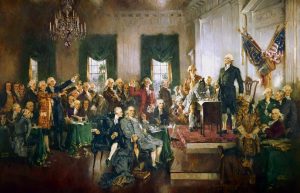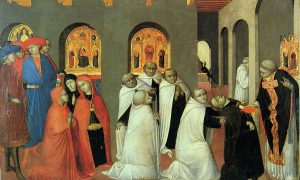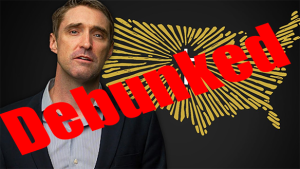“Woe to you, blind guides, who say, ‘If anyone swears by the temple, it is nothing, but if anyone swears by the gold of the temple, he is bound by his oath.’ You blind fools! For which is greater, the gold or the temple that has made the gold sacred? And you say, ‘If anyone swears by the altar, it is nothing, but if anyone swears by the gift that is on the altar, he is bound by his oath.’ You blind men! For which is greater, the gift or the altar that makes the gift sacred? So whoever swears by the altar swears by it and by everything on it. And whoever swears by the temple swears by it and by him who dwells in it. And whoever swears by heaven swears by the throne of God and by him who sits upon it. – Matthew 23:16 – 22
There are certain patterns you see among Christian Nationalists’ belief systems. For example, we repeatedly see the modern church being compared to the Pharisees.
“The mentality of the Pharisees places God at the center of everything, but He is worshiped as an impersonal and powerless deity. Their God dwells mostly in the realm of theory and reverence that is self-serving. But there is not much in the religious community (the church) that is actually from the Kingdom of God.” – Lance Wallnau, The Seven Mountains Mandate
The idea here is that the Church has entered a “rut” and become stuck in its ways. Becoming overly religious and has detached itself from the world. Is this even true, though? Has the Church fallen into the sins of the Pharisees?
A Serious Accusation
Before we delve into who the Pharisees were and compare them to the modern Church, it is essential to note that comparing someone to a Pharisee should not be done in jest or taken lightly. Christ himself was more than severe when speaking of the Pharisees:
“Woe to you, scribes and Pharisees, hypocrites! For you build the tombs of the prophets and decorate the monuments of the righteous, saying, ‘If we had lived in the days of our fathers, we would not have taken part with them in shedding the blood of the prophets.’ Thus you witness against yourselves that you are sons of those who murdered the prophets. Fill up, then, the measure of your fathers. You serpents, you brood of vipers, how are you to escape being sentenced to hell? Therefore I send you prophets and wise men and scribes, some of whom you will kill and crucify, and some you will flog in your synagogues and persecute from town to town, so that on you may come all the righteous blood shed on earth, from the blood of righteous Abel to the blood of Zechariah the son of Barachiah, whom you murdered between the sanctuary and the altar. Truly, I say to you, all these things will come upon this generation.” – (Matthew 23:29 – 36)
Jesus repeatedly proclaims the Pharisees’ Damnation. Condemning them for Hypocrisy, hubris, and blasphemy of the holy spirit (Matthew 12:22 – 23). To call someone a Pharisee is nothing less than to call them a self-righteous, false believer who faces hellfire. Do not make such accusations unless you have a very good reason to do so.
Who Were the Pharisees?
In the bible, there are two major Jewish sects that are dealt with by Jesus and later by the church. The Sadducees, who did not believe in an afterlife, instead seeing God as impersonal and inactive in the world. Then there were the Pharisees, a group that was very much aware of a spiritual realm and the afterlife (Acts 23:8 ESV). They were also open to and welcoming of the existence of the messiah. They studied the prophets and knew the messiah was imminent (Daniel 9:25 – 26). We also see them seeking the messiah. The Pharisees actively go to John the Baptist and ask him if he is the Messiah, Elisha, or the prophet greater than Moses (John 1:19 – 28).
The Pharisees do not start out hating Jesus. At first, they seem to respect him, calling him Rabbi and Teacher (John 3:2). They also test him to see if he could truly be the messiah. They repeatedly question Christ, trying to catch any lie, flaw, or mistake in his teaching (Luke 11:53 – 54). Finding no flaw in his teachings, they repeatedly demand signs from heaven (Matthew 12:38 – 39, Matthew 16:1). Ultimately, Christ holds up under scrutiny, and his true nature as the Son of God becomes undeniable.
Somewhere along the way however, the Pharisees grew to hate Jesus along with the Sanhedrin (The jewish leadership). They reject him as their messiah. They do not just plot to kill him (Mark 3:6), they hand him over to the Romans (Matthew 27:1) so they could have him humiliated, tortured, and executed in the most painful and degrading way possible. This in itself is evidence that they knew the true identity of Christ in their hearts. If they thought he was simply a false prophet, they would have him stoned as the Law commands (Deuteronomy 13:5). Instead, they seek the help of the Roman Empire to have him crucified. The question is why? What about Jesus causes the Pharisees to reject him so harshly?
The Messiah they Wanted
The Pharisees, along with the rest of the Jewish people, yearned for the arrival of the messiah. The problem is their expectations did not match up with the reality that was Jesus. They thought the messiah would be a warrior king. He would lead a military campaign that would liberate Israel from the Roman Empire and lead it into a new golden age.
We see this most explicitly in what happens after Jesus feeds the five thousand with five loaves of bread and two small fish:
“When the people saw the sign that he had made, they said, “This is indeed the Prophet who is to come into the world!” Perceiving then that they were about to come and take him by force to make him king, Jesus withdrew again to the mountain by himself.” (John 6:14 -15)
The Jewish people identify Jesus as the Prophet greater than Moses and plan to start a violent revolt. Hoping to take Jerusalem by force and make Jesus their King. Jesus then removes himself from their presence. Denying their belief that the Saviour would be a warrior king sent to bring Israel to glory.
The Messiah they got
The earliest conflicts between the Pharisees and Christ have to do with Christ’s rejections of Jewish tradition. The Pharisees had become so steeped in their culture and their self-righteousness that they held their man-made rituals equal to God’s law. (Mark 7:6-9, Matthew 15:1-9) This magnified their self-righteousness and hardened their hearts (Matthew 5:19-20). Christ doesn’t just admonish them, he outright rejects and denies their traditions and culture. Proclaiming them white washed tombs who would murder the Prophets who delivered God’s law in the name of their “traditions” (Matthew 23: 27 – 28).
Christ did proclaim that he was a king, however he made it clear that Israel was not his kingdom:
“Jesus said, “My kingdom is not of this world. If it were, my servants would fight to prevent my arrest by the Jewish leaders. But now my kingdom is from another place.”
“You are a king, then!” said Pilate.
Jesus answered, “You say that I am a king. In fact, the reason I was born and came into the world is to testify to the truth. Everyone on the side of the truth listens to me.”” (John 18:36 – 38)
Those Who Came After Christ
Stephen was a member of the early church who served as a deacon and would come to be known as the first Christian martyr. While being held on trial by the Jewish Leadership, he speaks to them honestly. calls the members of the Sanhedrin a “stiff-necked people” (Acts 7: 51) referencing Proverbs 29:1.
“He who is often reproved, yet
Stiffens his neck,
Will suddenly be broken beyond healing.”
Steven then cries out. Proclaiming Christ’s divinity. In response to this, the Sanhedrin cover their ears and yell at the top of their voices. So enraged by the undeniable truth of The Son of God that they threw tantrums like screaming children before killing Stephen for speaking the truth.
Rejecting the Culture
“And he died for all, that those who live should no longer live for themselves but for him who died for them and was raised again. So from now on we regard no one from a worldly point of view. Though we once regarded Christ in this way, we do so no longer. Therefore, if anyone is in Christ, the new creation has come. The old has gone, the new is here!” (2 Corinthians 5:15 – 18).
Just as Christ died and was born again, so we must die and be born again if we are to enter the Kingdom of God. The cultures of this earth, being a product of man’s sin, can not be lifted or changed to be made more like Christ; they must be destroyed in us to make way for something new.
“Do not conform to the pattern of this world, but be transformed by the renewing of your mind. Then you will be able to test and approve what God’s will is—his good, pleasing, and perfect will.” (Romans 12:2)
The Nature of The Kingdom
Time and time again, we are told the Kingdom of God is an eternal heavenly Kingdom, a kingdom far greater than any that could be manifested on earth, and a kingdom which can only arrive once the old creation has been done away with.
“See that you do not refuse him who is speaking. For if they did not escape when they refused him who warned them on earth, much less will we escape if we reject him who warns from heaven. At that time his voice shook the earth, but now he has promised, “Yet once more I will shake not only the earth but also the heavens.” This phrase, “Yet once more,” indicates the removal of things that are shaken—that is, things that have been made—in order that the things that cannot be shaken may remain. Therefore let us be grateful for receiving a kingdom that cannot be shaken, and thus let us offer to God acceptable worship, with reverence and awe, for our God is a consuming fire.” (Hebrews 12:25 – 29)
When Christ returns, it will not be to transform the nations of the earth but to destroy them. We must be careful not to let our culture obscure the truth. The cultures of this earth are temporary and will be done away with when Christ returns in glory. This is why the Pharisees hated Jesus. They had him killed because they knew him to be the Messiah, but the Messiah rejected Israel and its culture, so they rejected the messiah. They chose their earthly state over his heavenly kingdom, and by doing so, chose their own destruction.
Damnation of the Patriots
Speaking personally, I believe it is good that every man would have a sacrificial love for their countrymen, whether they be American, Israelite, or citizens of any other earthly kingdom. As Christians however, we must realize our citizenship in these nations is temporary. Eventually, God will call each of us to betray our countries. On Judgement Day, you will have to make a choice: Abandon these United States and become citizens of the eternal kingdom, or face the hellfire of eternal damnation.
So the question still remains: has the modern Church become like the Pharisees? Has the church taken its manmade traditions and held them as equal to God’s law? Has the modern church become so self-righteous and prideful as to reject the messiah in the name of culture and nationalistic pride? Let me know what you think in the comments.




One Response
Well you have churches that hold, living together out of Wedlock is a big sin. Yet they refuse to marry you to get out of that sin because your tarnished. Seems pretty old school Pharisees to me.